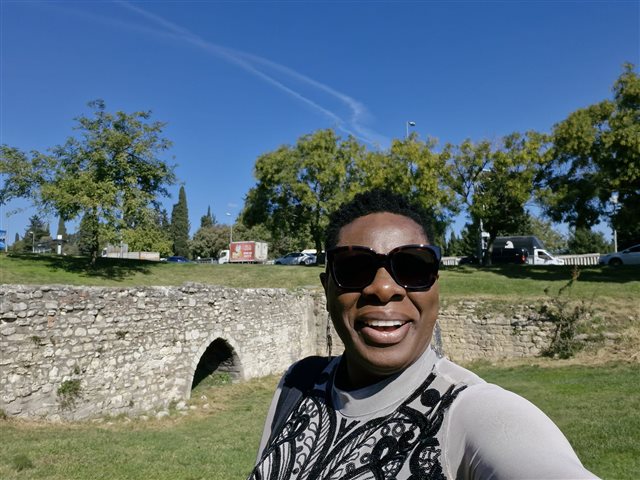For End Digital Poverty Day, we met with Sekinat Saka, known to many as Seki. Seki shares how her connection with the IET began during her early studies in Nigeria and how an IET bursary played a pivotal role in supporting her through a challenging period while studying for her Master’s degree in the UK.
Today, Seki continues to make a meaningful impact through her volunteer roles as a Professional Development Scheme Accreditation Assessor, Registration Assessor, Professional Development Mentor and recently accepted invitation to join as a member of the Professional Development Operations Committee. Her story is one of resilience, growth, and a passion for helping others thrive in their engineering careers.
Seki’s connection with the IET began in 1994, during her first year studying electrical and electronic engineering in Nigeria, back when the Institution was still known as the IEE. As a first-year student, she attended a talk by an IEE representative who visited her polytechnic. The talk was inspiring; it opened her eyes to what an engineering career could be and how the Institution could help her achieve her aspirations. She left that day with a clearer sense of purpose and a determination to carve out her path in the profession.
From that moment on, she made the most of the resources available, attending events, reading journals, and exploring different areas of engineering. Years later, when she moved to the UK to continue her studies, staying connected with the IET was a natural choice. The support she had experienced was consistent, reliable, and impactful, and she knew it would continue to be a valuable part of her professional development.
The Impact of an IET Bursary
After completing her BSc degree, Seki faced challenges securing employment, which led her to pursue a Master’s degree to broaden her career prospects. At the time, she was also raising a young family with two children, making the balance between academic demands and parenting particularly difficult. That’s when the IET bursary made a real difference. With the support, she was able to purchase a high-end laptop, allowing her to work efficiently from home rather than relying on university facilities.
“That flexibility meant I could manage childcare responsibilities while keeping up with my coursework,” she recalls. “I graduated with a strong grade without compromising precious family time.”
It was the unwavering support she received from the IET throughout her career that inspired her to give back. “Looking back, the IET has been there at every stage of my journey, from a young student in Nigeria, to a professional engineer in the UK, to a mentor helping others achieve their goals,” she says. Volunteering became her way of helping others benefit in the same way.
Shaping and Being Shaped by Volunteering
Through her many volunteering roles, Seki has found volunteering with the IET to be a tremendous learning experience. By reviewing and assessing professional development schemes and registration applications, she’s gained valuable insights that have strengthened her own professional practice and leadership. It has boosted her confidence in mentoring colleagues, enhanced her ability to provide tailored support, and sharpened her professional judgment. “It’s been as much about my growth as it has been about helping others succeed,” she reflects.
Her volunteering has also allowed her to guide early-career engineers and colleagues toward achieving professional registration at various levels, both in the UK and internationally including in India. Alongside these roles, she has contributed to IET events and continues to support the development of others across the profession.
One particularly memorable experience was serving on the accreditation panel for Shell’s graduate scheme. Three developing engineers from Shell Nigeria presented their work, and the panel was so impressed with their competency that they recommended the engineers apply for Chartered Engineer (CEng) registration. “The satisfaction on their faces was unforgettable,” Seki says. “They realised their work was recognised not just locally, but internationally. It removed boundaries and gave them the freedom to explore opportunities anywhere in the world.”
Since then, Seki’s career has been varied and rewarding. She has worked across multiple areas of electrical engineering, from telecommunications, highway construction to building and places design, supporting both public and private sector projects. She’s also continued to give back to the profession, mentoring engineering students from her former university and helping them prepare for job applications, interviews, and early career challenges, as well as reviewing job roles against their aspirations, strengths, and areas for growth.
Tackling Digital Poverty
Seki is passionate about addressing digital poverty, drawing from her own experience. “Access to technology and information is a game-changer,” she says. Her advice to others is to make use of professional networks like the IET, online learning resources, and community initiatives that can help bridge the gap. She’s personally used IET resources, technical forums, specialist knowledge, and professional connections, to deliver high-quality designs and specifications. “Knowledge and connection can help overcome many barriers, and the right support can transform a career.” 
In summary, volunteering has shaped Seki as much as she’s shaped others. It has improved her confidence in mentoring, sharpened her professional judgment, and given her insights that she’s applied in her own work and within her team.